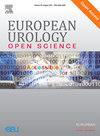Diagnostic Performance of GeneXpert BC as a Triage Test for Patients Presenting with Macroscopic Hematuria Suspicious for Urinary Bladder Cancer: A Multicenter Prospective Case-Control Study
IF 3.2
3区 医学
Q1 UROLOGY & NEPHROLOGY
引用次数: 0
Abstract
Background and objective
Our objective was to assess whether GeneXpert BC can be used as a triage test to exclude urinary bladder cancer (UBC) for patients with macroscopic hematuria.
Methods
We conducted a prospective study that include consecutive patients being evaluated for macroscopic hematuria between September 2020 and December 2022. Before cystoscopy, study participants provided a voided urine sample for GeneXpert BC analysis according to a case-control design with an emphasis on UBC detection. Descriptive statistics are reported for patient and tumor characteristics. To assess the diagnostic accuracy of the GeneXpert BC test, the sensitivity, specificity, and negative predictive value (NPV) were calculated, using the histopathologically proven UBC as the ground truth.
Key findings and limitations
In total, 1505 subjects presenting with macroscopic hematuria were enrolled in the study. After randomization and exclusions, GeneXpert BC testing was carried out for 312 participants. Of these, 151 patients from the case arm had UBC, 122 patients from the control arm (random 10%) were negative for UBC, and 39 patients from the case arm did not have malignancy. Using a predefined linear discriminant analysis (LDA) threshold of ≥0.22, the test had sensitivity of 0.94 (95% confidence interval [CI] 0.90–0.97), specificity of 0.52 (95% CI 0.42–0.59), and NPV of 0.99 (95% CI 0.98–0.99). All false-negative tumors were of low grade (Ta grade 1–2). Cystoscopy and computed tomography urography could have been omitted in 44% of the patients with macroscopic hematuria. At a secondary LDA threshold of ≥0.45, the test had sensitivity of 0.79 (95% CI 0.73–0.86), specificity of 0.83 (95% CI 0.76–0.89), and NPV of 0.97 (95% CI 0.96–0.98).
Conclusions and clinical implications
GeneXpert BC is a reliable triage test for deciding on whether further investigations are necessary in patients with macroscopic hematuria.
Patient summary
We assessed a test called GeneXpert BC for the detection of bladder cancer in patients with blood in their urine. GeneXpert BC performed well in ruling out bladder cancer for patients who did not have cancer according to further tests. Use of GeneXpert BC could help in avoiding scans and invasive tests for patients with a negative result.
GeneXpert BC 作为对出现宏观血尿怀疑膀胱癌患者的分诊检验的诊断性能:一项多中心前瞻性病例对照研究
背景和目的我们的目的是评估 GeneXpert BC 是否可用作大镜下血尿患者排除泌尿系统膀胱癌(UBC)的分诊检验。方法我们开展了一项前瞻性研究,研究对象包括 2020 年 9 月至 2022 年 12 月期间接受大镜下血尿评估的连续患者。在进行膀胱镜检查之前,研究参与者提供了排空尿液样本,以便根据病例对照设计进行 GeneXpert BC 分析,重点是 UBC 检测。报告了患者和肿瘤特征的描述性统计。为了评估 GeneXpert BC 检验的诊断准确性,研究人员以组织病理学证实的 UBC 为基本事实,计算了灵敏度、特异性和阴性预测值 (NPV)。经过随机和排除后,对 312 名参与者进行了 GeneXpert BC 检测。其中,151 名病例组患者患有 UBC,122 名对照组患者(随机 10%)UBC 阴性,39 名病例组患者没有恶性肿瘤。使用预定义的线性判别分析(LDA)阈值≥0.22,该检验的灵敏度为 0.94(95% 置信区间 [CI] 0.90-0.97),特异性为 0.52(95% CI 0.42-0.59),NPV 为 0.99(95% CI 0.98-0.99)。所有假阴性肿瘤均为低级别肿瘤(Ta 1-2 级)。44%的大镜下血尿患者可以省略膀胱镜检查和计算机断层扫描尿路造影。在二级 LDA 临界值≥0.45 时,该检验的灵敏度为 0.79(95% CI 0.73-0.86),特异性为 0.83(95% CI 0.76-0.89),NPV 为 0.97(95% CI 0.96-0.98)。结论和临床意义GeneXpert BC是一种可靠的分诊检验,可用于决定是否需要对大镜下血尿患者进行进一步检查。 患者摘要我们对一种名为GeneXpert BC的检验进行了评估,该检验可用于检测尿血患者是否患有膀胱癌。基因Xpert BC在排除膀胱癌方面表现出色,可用于进一步检查未发现癌症的患者。使用 GeneXpert BC 可以帮助结果为阴性的患者避免扫描和侵入性检查。
本文章由计算机程序翻译,如有差异,请以英文原文为准。
求助全文
约1分钟内获得全文
求助全文
来源期刊

European Urology Open Science
UROLOGY & NEPHROLOGY-
CiteScore
3.40
自引率
4.00%
发文量
1183
审稿时长
49 days
 求助内容:
求助内容: 应助结果提醒方式:
应助结果提醒方式:


